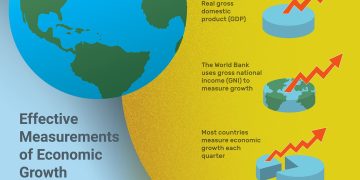Introduction
Since President Joe Biden took office in January 2021, his administration has pursued an ambitious economic agenda aimed at addressing key challenges facing the U.S. economy. From tackling the COVID-19 pandemic to promoting clean energy, healthcare, and technology advancements, Biden’s economic policies have far-reaching implications for both domestic and global markets. This article provides an overview of the key economic policies under the Biden administration, explores how changes in tax policies and government spending are affecting markets, examines the potential impact on industries like clean energy, healthcare, and technology, and offers expert predictions on the long-term implications for U.S. investors.
1. Overview of Key Economic Policies Under the Biden Administration
Upon assuming office, President Biden focused on implementing a wide array of economic policies designed to address both immediate and long-term challenges. Among the primary goals of these policies are recovering from the economic impacts of the COVID-19 pandemic, reducing income inequality, tackling climate change, and strengthening the U.S. economy for future competitiveness. Some of the most significant policies that have shaped his administration’s economic agenda include:
COVID-19 Relief and Recovery
One of the Biden administration’s earliest and most important priorities was to provide comprehensive relief to American workers, businesses, and healthcare systems impacted by the COVID-19 pandemic. The American Rescue Plan Act of 2021 was a key piece of legislation that provided $1.9 trillion in relief, which included direct stimulus payments to individuals, extended unemployment benefits, and support for vaccine distribution. This effort was aimed at stimulating economic recovery and addressing public health needs.
Infrastructure Investment
Another cornerstone of Biden’s economic agenda is his focus on infrastructure investment. The Infrastructure Investment and Jobs Act, signed into law in November 2021, allocates $1.2 trillion for improving the nation’s infrastructure. This includes investments in transportation, broadband internet, water systems, and renewable energy infrastructure. The goal is not only to modernize physical infrastructure but also to create jobs, stimulate economic growth, and lay the foundation for a more sustainable economy.
Clean Energy Transition
Biden’s administration has made addressing climate change a top priority, and one of its key focuses is transitioning the U.S. economy toward clean energy. The administration’s goal of achieving net-zero carbon emissions by 2050, along with ambitious targets for reducing greenhouse gas emissions, has driven investments in renewable energy sources such as solar, wind, and electric vehicles (EVs). As part of this transition, the administration has advocated for incentives, subsidies, and regulatory changes to support clean energy innovation and growth.
Tax Reforms and Corporate Taxes
The Biden administration has proposed several changes to the U.S. tax system, particularly focusing on increasing corporate taxes and raising taxes on high-income earners. Biden’s plan aims to fund public investments, including infrastructure, education, and healthcare, by raising the corporate tax rate from 21% to 28% and implementing measures to address tax avoidance by multinational corporations. These proposed tax changes have implications for both businesses and individual investors, and their eventual passage is likely to reshape certain sectors of the economy.
2. How Changes in Tax Policies and Government Spending Are Affecting Markets
The Biden administration’s changes in tax policies and government spending have already begun to have significant impacts on markets. The proposal for higher corporate taxes and individual tax rates, coupled with increased government spending, is reshaping the financial landscape.
Corporate Tax Increases and Market Sentiment
The proposed increase in corporate taxes is one of the most talked-about aspects of Biden’s economic agenda. While higher taxes are intended to fund public investments and reduce the federal deficit, they can have mixed effects on markets. On the one hand, higher taxes could reduce corporate profitability, leading to lower stock prices in some sectors, particularly those heavily reliant on low taxes. On the other hand, higher corporate taxes could increase government revenue, leading to more government spending on infrastructure, healthcare, and clean energy, which could stimulate growth in these sectors.

Government Spending and Economic Stimulus
Biden’s aggressive spending agenda, particularly in infrastructure, healthcare, and clean energy, has had a positive impact on certain sectors of the economy. Increased government spending has provided a boost to industries involved in infrastructure development, such as construction, transportation, and manufacturing. For example, the Infrastructure Investment and Jobs Act is expected to create significant opportunities for companies involved in building roads, bridges, and broadband networks.
At the same time, government spending on renewable energy and electric vehicles is pushing these industries to the forefront. Companies involved in clean energy production, EV manufacturing, and related technologies are seeing increased demand, as the U.S. government incentivizes green investments through subsidies and grants.
Impact of Tax Policies on Investor Sentiment
For investors, the changes in tax policy introduced by the Biden administration could have significant implications for the markets. The proposed tax hikes on high-income earners and corporations could discourage investment in certain areas of the economy, particularly in sectors that rely on low corporate tax rates. However, these tax changes could also provide opportunities in sectors directly benefiting from government spending and the shift toward clean energy.
3. The Potential Impact on Industries Like Clean Energy, Healthcare, and Tech
Several key industries are expected to be impacted by the Biden administration’s economic agenda, with clean energy, healthcare, and technology being among the most prominent.
Clean Energy
Clean energy is one of the central focuses of the Biden administration, and this sector stands to benefit significantly from government policies. The administration’s goal of achieving net-zero carbon emissions by 2050 and its emphasis on renewable energy technologies has led to increased investments in solar, wind, and electric vehicles. Policies such as tax credits for clean energy production and electric vehicle adoption, as well as regulatory support for clean energy infrastructure, have provided a favorable environment for growth in this sector.
Healthcare
Healthcare is another area where the Biden administration has made significant policy changes. The administration’s push to expand the Affordable Care Act (ACA) and its focus on increasing access to healthcare for all Americans have led to potential growth opportunities for healthcare providers, insurance companies, and pharmaceutical firms. Additionally, the COVID-19 pandemic has spurred growth in sectors such as telemedicine and biotechnology, with the government providing support for vaccine distribution and healthcare infrastructure.
Technology
Technology, particularly in the areas of information technology, cybersecurity, and artificial intelligence (AI), is another sector benefiting from Biden’s economic agenda. The administration has emphasized the importance of technological innovation for economic growth and national security. Additionally, the growing demand for renewable energy technologies, such as smart grids and energy storage systems, provides further opportunities for tech companies involved in clean energy.
4. Expert Predictions on the Long-Term Implications for U.S. Investors
Experts have mixed views on the long-term impact of the Biden administration’s economic agenda on U.S. investors. Some believe that the focus on clean energy, infrastructure, and healthcare will lead to sustained growth in these sectors, while others caution that higher taxes and government intervention could create headwinds for certain industries.
Growth in Clean Energy and Tech
Experts predict that the clean energy and technology sectors will continue to thrive under Biden’s policies. As the U.S. transitions to a more sustainable economy, companies involved in renewable energy, electric vehicles, and energy efficiency technologies are poised for significant growth. For investors, this means potential opportunities in stocks and ETFs focused on clean energy and sustainable technologies.
Healthcare and Biotechnology
Healthcare and biotechnology are also expected to see long-term growth, particularly as the Biden administration seeks to expand healthcare access and address public health challenges. The increasing demand for healthcare services, combined with government support for biotech research and development, makes this sector an attractive option for investors looking for growth opportunities.
Challenges from Higher Taxes
On the downside, higher corporate taxes and the potential for increased regulation could create challenges for certain sectors, particularly those that are heavily reliant on low taxes and minimal government intervention. Investors in industries such as traditional energy, manufacturing, and financial services may need to reassess their portfolios to account for the potential impact of these changes.
Conclusion
The Biden administration’s economic agenda is reshaping the U.S. economy and creating both opportunities and challenges for investors. While the focus on clean energy, healthcare, and technology presents significant growth potential, higher taxes and government spending policies could lead to mixed outcomes for certain sectors. As the administration continues to implement its policies, investors will need to carefully monitor developments and adapt their strategies to navigate the evolving economic landscape.



































